Ọlụ ka dịlị mụ na gị.
ọlụ, ọlụ ...
|1863| The expeditions planned to the Niger have all happened. With varying degrees of success. Contacts had begun to be made and had been sustained for a while more or less between the natives of the hinterland and various cadres of prospecting Europeans. Lore has it that the important figures in the lives and customs of the natives actively sought to extend this fellowship, which they thought might result in mutual gain; for the native and then for the foreigner.
One such outpost of the exploration of 'fraternal bonds' was the one established at Onitsha. The date usually given for it is 27 July 1857. On this day Samuel Adjayi Crowther and Obi Akazua of Onitsha 'executed' an agreement that a trading post was to be established by Europeans and that a Christian mission was to be an important part of the deal.
And so began, it is said, the Christianising mission among the Igbo.
Any serious intent to communicate the Gospel to the Igbo had to be carried on in an intelligible language. The reverend Crowther (later Bishop) was Yoruba and the go between the language of the discourse was English. Igbo was still classed as an illiterate language of the world. This is not strictly true as a form of drawn script was in use by the Igbo of the South East :- Nsibidi was a written language of adepts and initiates. The use of such Ideograms, ideographs and depictions are evidence of writing, speciation and some sophistication but communication was impossible, between native and foreigner if the latter found the former's language unintelligible. It was owing to some such problem as defined directly above here that the 'romanisation of Igbo began'.
The tracings of such romanisation will be found in a work which appeared in 1863, by Richard Lepsius Standard Alphabet for Reducing Unwritten Languages and Foreign Graphic Systems to a Uniform Orthography in European Letters. In that work, an orthography for Igbo is given though suggested by the educated Samuel Crowther and the Father Schṓn (a German priest), an adept with whom the former worked.
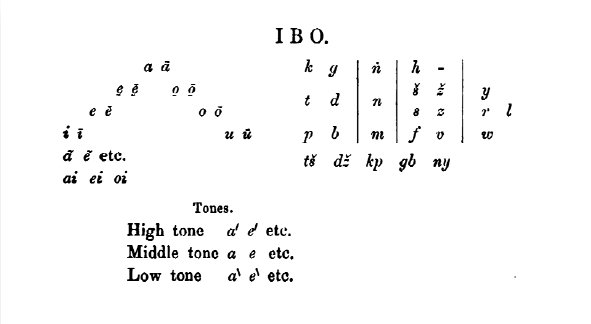
A fuller sample contains some of the first conscious Igbo words caused to be written by anyone, anywhere in the world: written (that is), in 'Roman lettering' or 'European characters'.
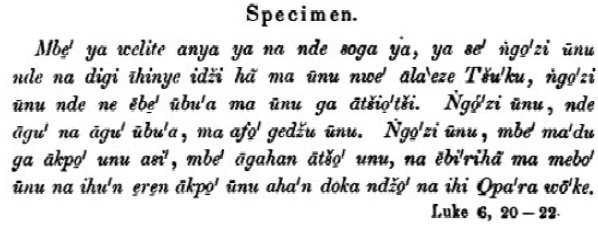
Thus, it may be said that the Igbo language was carbonised in the words of scripture.
|1910| A government anthropologist is hard at work among the Igbo. Writing, studying and graphing away. He had been studying the Igbo for a while and was making his career as the manner of the time was. He found among the Igbo a most curious people, being among the last of Africa’s ethnic groups now being learnt about by representatives of the European cultures that had come to live among them. I prefer that the Igbo were being learned about as opposed to being ‘studied’ (say as one might study, an insect population with detachment). Because you can learn about other people without prejudice and as part of good neighbourliness but any suggestion that you are studying a people in the other sense could (even for those times) easily leave one’s self open to all sorts of pejorative charges and causes.
Thomas was considered a curious fellow himself (simple and given to rum) and although his rather eccentric methods proved thorough, he bothered his employers and they redeployed him to Sierraleone and then home. In the end (meaning by 1914) Northcote Thomas had produced bulky tomes which he gave to his employers. He had produced a book of Igbo proverbs and folktales. He had also produced a readable lexicon of Igbo words (many with meanings still used up until the present day) and he had written extensively about the life and cultures of those whom he studied. His place is hardly recognised by all the champions of Igbo language development today. He had taken some of the only photos seen of the drawn Nsibidi script used among the Igbo as also among others. But Northcote worked mainly among the Igbo of Akwa district and Onitsha, (for he also studied the Asagba and the Edo) and Igbo was a vast country with a numerous population (reaching to the sea). The Internet Archive (online) is one place to view samples of his work. Another place is at the Museum of Archaeology and Anthropology, University of Cambridge. Three egbes for him.
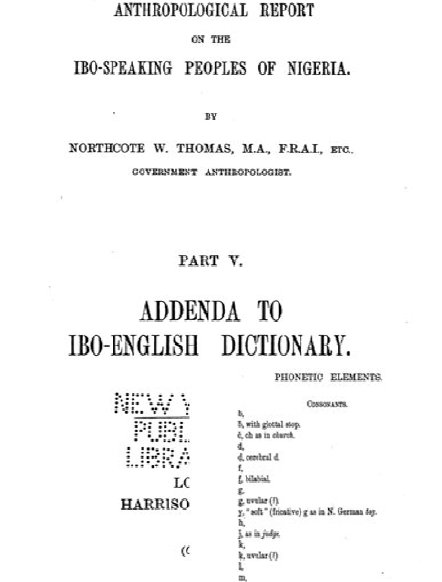
|1906|. Another British man had been working among the Igbo trying to produce a readable bible of the Igbo. A priest. A studious man. Another Thomas (for his name was Thomas Dennis). He actually succeeded and produced a work in an Onitsha dialect. But Archdeacon Dennis knew that the Igbo were many through what he had learnt from brother missionaries from Sierra Leone. Any bible of the Igbo worth its name had to be one that could find extensive use all over the country. A bible that will be used for evangelism of the ‘savage’ Igbo throughout that vast extent of country. He set about his task with much prayer and exertion to produce the ‘Baibụlụ Nsọ’ while working closely with other Igbo brethren. He took ill and sought to ferry his finished manuscript to the home country to be produced. But Europe was at war (in 1917) and his boat, the SS Karina was torpedoed. He lost his life in the tragic incident, yet the manuscript survived the ordeal ¹ and floated in a box either to shore or was otherwise retrieved at the surface.
In the end it was ‘savage’ Europe instead, which had taken his life but, Providence had intervened and the Igbo bible was produced. Its text has been used extensively among the Igbo and the CMS missionary branch of activists that were/are active in Igbo life.
The text too is much maligned and criticised for being no one’s dialect, written in an Igbo which no one ‘actually spoke’ or speaks. Professor Achebe famously spoke against it during his Odenigbo lecture(s) of 1999 and another priest Basden (one who must be considered a contemporary of the mercurial Dennis) described the Bible as an unintelligible Esperanto.
I1919| Biabụlụ Nsọ nonetheless gave the Igbo a phase within its language development, for it is the text of that Bible – Dennis’ bible – which fixes the Union Igbo period of language development that researchers write about. The Union Bible proved suitable – more or less till 1939 when proposals amidst the ceaseless language experimentation championed by foreigners in the languages of Africa began to yield some impetus towards the production of an ‘African script’ or orthography. Dennis, for leading a visionary project and for seeking to tease out the essential unity of the Igbo and Igbo language speakers - through graphing its language - is irrefutably a part of Igbo language development. Three ‘egbes’ for him.

|1941| (Dr)( (later, professor, I think)) Ida Ward had seized upon this idea of an 'African orthography' and brought that impetus to her study of Igbo dialects. She produced the seminal monograph or book: ‘Ibo dialects and development of a common language’. Most thorough and I suppose well meaning insofar as actual intent goes but she had misjudged the Igbo a bit in seeking to accord their 'lingua franca' a place within the new resulting ‘experimental’ African script. If Dennis' usage was an unintelligent Esperanto, seeking to lead the graphisation of Igbo (by which I mean its writing) away in pursuit of supranational goals was a grave 'faux pas'. To be sure, Ward was unsure of ‘Union Igbo’ but her time of working within Igbo language development produced a phrase and a phase with which we are stuck today; for it was she that proposed the meme ‘Central Igbo’ as a kind of compromise dialect between the dialects of Onicha (sic) country and Owere (sic) country (she said, but not in those terms).
She was at pains to explain that this did not follow the provincial divisions of the British who had also designated Onitsha (sic) and Owerri (sic) provinces but ideas are hard things to shift once planted and the meme stuck. Ida Ward was going to do away too with the diacritics which are settled features of today’s writing. But not if characters like F.C Ọgbalụ were going to have anything to do with it. Still, Professor Ida Ward was a brave warrior in her day's Igbo language battles. Three ‘egbes’ for her.
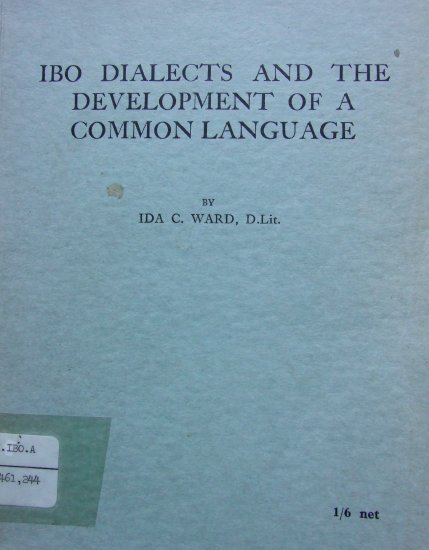
|1951| (Dr)(Ọgbalụ) has produced his pamphlet criticising Ida Ward and her whole department and any other colleagues silly enough to think that Igbo intellect and natural talent must constantly yield ground to influences (or even innovations) imposed from the ‘outside in’
For him, and others like him, the era of foreign intervention in Igbo language development had definitely come to an end. And it was time to leave native and mother tongue language development, firmly in the hands of the natives themselves. Maybe, the spirit and winds of independence coursing across African shores (and Igbo’s shores particularly) at the time had something to do with it. Together with his SPILC (Society for the Promotion of Igbo Language and Culture (Custom, some say – I have evidence it is Culture, but what does it matter — isn't culture a kind of custom and vice versa?) Ọgbalụ overturned the carts of excessive foreign meddling in the language- and the Igbo were happy. I mean here was one of our own: ‘nke anyị’: doing the business and taking on the language scientists on their own turf. And he won.
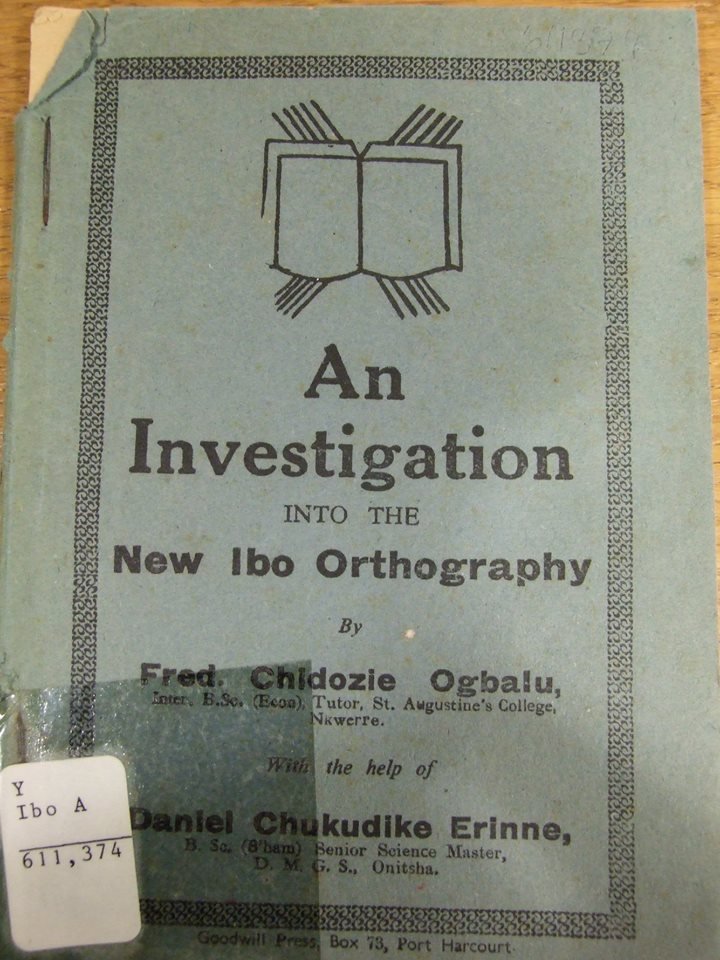
Due to the efforts of men and women like Ọgbalụ, diacritics were retained and a proto-standard form of the language was promulgated (declared) in 1961 under the aegis of Dr, S.Ọnwụ (Asst. director for medical services, Eastern Nigeria), whose name got attached to the ‘standard orthography’. Ọgbalụ went on to produce the first modern Igbo-English dictionary of the time (1963), advocating 'dialect levelling' and his name has remained synonymous with language development exploits among the Igbo ever since. Ọgbalụ, for being trained as an Economist yet turning his talent, genius and prodigious energy to Igbo language development, deserves egbes. So three ‘egbes’ for him.
|1961| Folk may disparage the standard, but not only did it establish ‘forever’(?) the basic alphabet of Igbo language, it suggested many of its key grammatical features (still in force) and proclaimed a system of vowel harmony (a most helpful notion of progress within the language). The 1961 text of this orthography, (produced as an aid to guide teachers and guides of the language everywhere, is available as a pdf on the Internet and can be downloaded by anyone with an interest in these things.
We were doing well and then the war happened ...

|Today| I often tell people interested in this our language to go back to that 1961 document and to study it because it suggests many things and can cure much that is wrong with today’s writing and experimentation (still ongoing with Igbo). Time and space have failed me to mention the real big giants of modern Igbo language battles, the Emenanjo’s and Akujuobi’s. The Achebe’s and Bishop Obinna’s of this world and many others of their contemporaries who braved and thrived in the great glorious jungle of Igbo Language exploits. Big beasts all. And then, I am similarly constrained and cannot quite mention many of the younger poets and upstarts who make Igbo reading, writing and Igbo performance arts a constant spectacle of joy, today. Three egbes!!! gbosas!!! for them all.
And perhaps you may claim one for yourself².
This essay is dedicated to one such poet, maazị Nnamdi Ejekwumadu for reminding an old sleuth like me that today was in fact ‘mother tongue day’ ...
¹Part of the recounted Anglican-Igbo mythology. Ben Fulford's account reports the items rescued to be: an Igbo reader of sorts, a dictionary and 'some leaflets' at a Welsh shore. Read it in a book account of the life Rev Dennis written by J Goodchild
[A rough draft of the essay appeared on Facebook where its appearance on steemit.com was presaged.]
²If you find any factual errors or problems with grammar, please drop me a line in the comments or email me in some way or the other and I should seek to correct it (them).
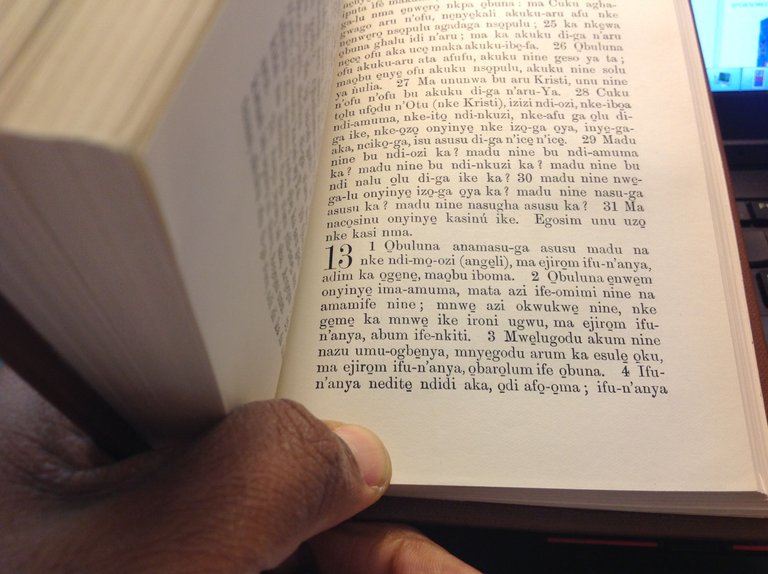
Graphisation = Graphitisation* ... Please note.